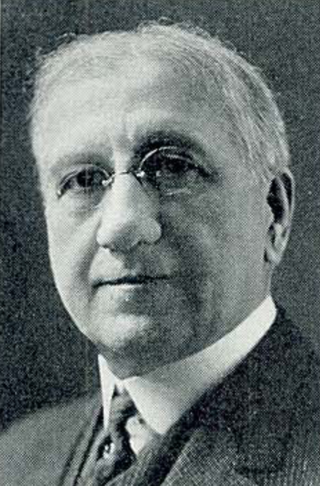Robert G. Siebecker
American judge, 11th Chief Justice of the Wisconsin Supreme Court From Wikipedia, the free encyclopedia
Robert George Siebecker (October 17, 1854 – February 12, 1922) was an American attorney and jurist from Wisconsin. He was the 11th chief justice of the Wisconsin Supreme Court, and served on the Court for the last 19 years of his life (1903–1922). Before being appointed to the Supreme Court, he served 13 years as a Wisconsin circuit court judge in central Wisconsin (Dane, Sauk, Columbia, and Marquette counties). Earlier, he was a law partner of Robert M. "Fighting Bob" La Follette, and married La Follette's sister, Josephine.
The Honorable Robert G. Siebecker | |
|---|---|
 | |
| 11th Chief Justice of the Wisconsin Supreme Court | |
| In office July 13, 1920 – February 12, 1922 | |
| Preceded by | John B. Winslow |
| Succeeded by | Aad John Vinje |
| Justice of the Wisconsin Supreme Court | |
| In office April 9, 1903 – February 12, 1922 | |
| Appointed by | Robert M. La Follette |
| Preceded by | Charles V. Bardeen |
| Succeeded by | Charles H. Crownhart |
| Wisconsin Circuit Court Judge for the 9th Circuit | |
| In office January 1890 – April 9, 1903 | |
| Appointed by | William D. Hoard |
| Preceded by | Alva Stewart |
| Succeeded by | E. Ray Stevens |
| Personal details | |
| Born | Robert George Siebecker October 17, 1854 Sumpter, Wisconsin, U.S. |
| Died | February 12, 1922 (aged 67) Madison, Wisconsin, U.S. |
| Resting place |
|
| Spouse | |
| Children |
|
| Parent |
|
| Relatives | Robert M. La Follette (brother-in-law) Robert M. La Follette Jr. (nephew) Philip La Follette (nephew) |
| Alma mater | University of Wisconsin |
| Profession | Lawyer, judge |
Early life and education
Siebecker was born in the town of Sumpter, in Sauk County, Wisconsin, the son of recent German American immigrants. He moved to Madison, Wisconsin, to attend a private academy in 1872. In 1874 he entered the University of Wisconsin, graduating in 1878. He then attended the University of Wisconsin Law School and graduated in 1880. While at the university, he met Josephine La Follette, whom he later marry. Josephine was the sister of future Wisconsin Congressman, Governor, and U.S. Senator Robert M. "Fighting Bob" La Follette.
Siebecker was admitted to the bar in 1879 and entered into a law partnership with La Follette.[1] Within a few years, both men entered public office. La Follette was elected to Congress in 1884, and Siebecker was elected City Attorney for Madison in 1886.[1]
Wisconsin Circuit Court
Siebecker was appointed Judge of the 9th Circuit of Wisconsin Courts by Governor William D. Hoard in January 1890. He ultimately served in that seat for 13 years, winning re-election without opposition in 1891 and 1897.[2] At the time, the 9th Circuit was composed of Columbia, Dane, Marquette, and Sauk counties, with court proceedings held in Portage, Madison, Montello, and Baraboo, respectively.
Wisconsin Supreme Court
On March 20, 1903, Wisconsin Supreme Court justice Charles V. Bardeen died. He had been set to run unopposed for another term on the court in the April 7, 1903, election. Because his death left no living candidates on the ballot, the Wisconsin Legislature took action to set a special nomination period for new candidates to file petitions to appear on the ballot. Siebecker was one of three candidates who filed sufficient signatures in the short, week-long nominating period.[3]
Judge Siebecker won the election to the Supreme Court for a term beginning January 1904, defeating J. G. M. Wittig and William Ruger—who had attempted to withdraw his name from the race.[4] Since the seat was already vacant, Governor La Follette—Siebecker's brother-in-law and former law partner—appointed him to join the court early almost immediately after the election.[1] He was the 20th justice to serve on the Wisconsin Supreme Court, but the first to have been born in Wisconsin.[5]
With the death of Chief Justice John B. Winslow in 1920, Siebecker became the 11th Chief Justice of the Wisconsin Supreme Court. He remained in that office until his death in 1922.[6][7]
Personal life and family
Siebecker married Josephine La Follette in 1879. They had four children together, although one child died young.
Siebecker died in his home in Madison, Wisconsin.[8] He was eulogized by fellow Justice E. Ray Stevens, who said of him, "There is romance in the career of this boy from the farm who closed his life as the chief justice of this great court."
In addition to his judicial career, Justice Siebecker was a member and curator of the State Historical Society of Wisconsin.[8]
References
External links
Wikiwand - on
Seamless Wikipedia browsing. On steroids.
